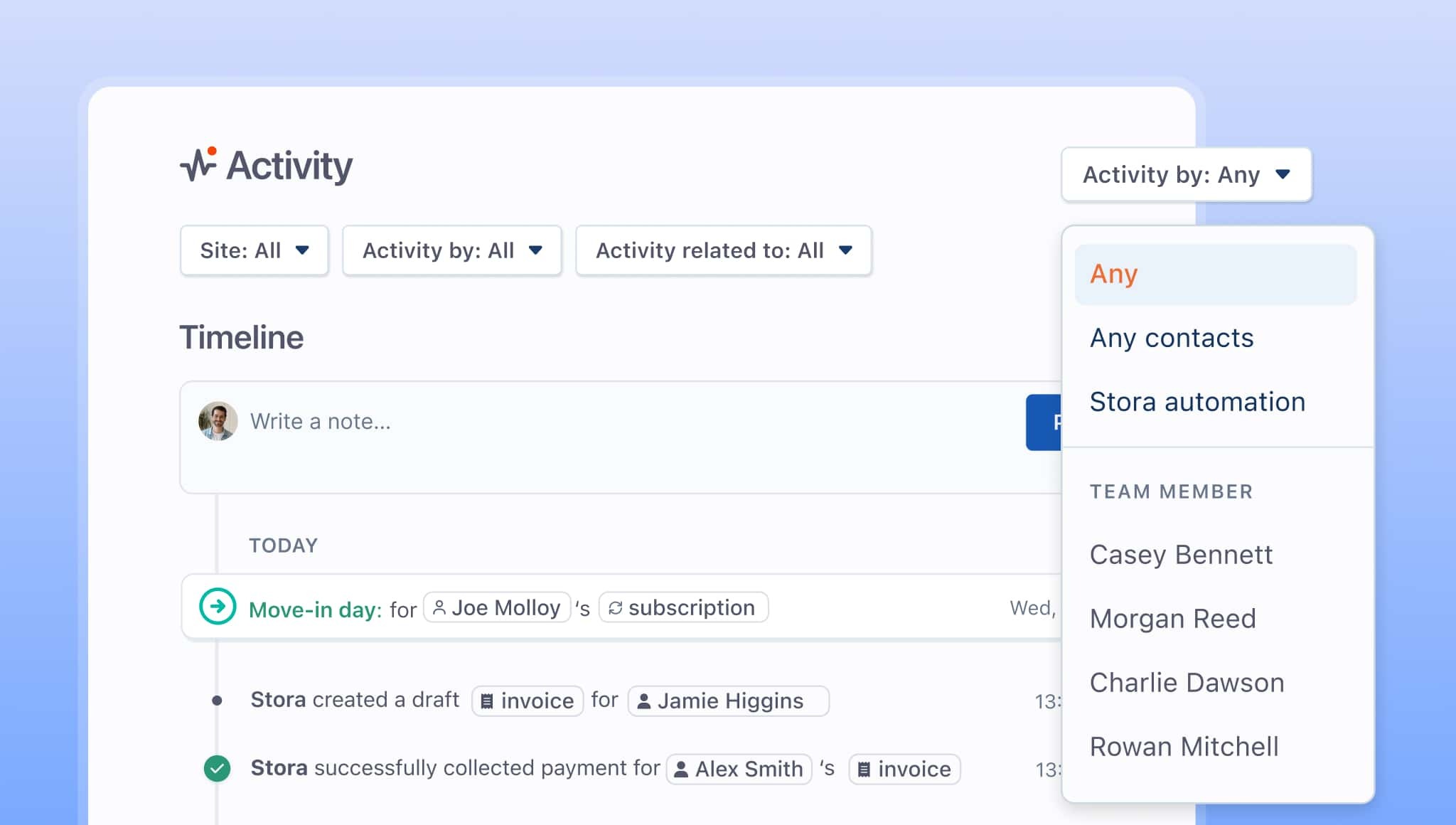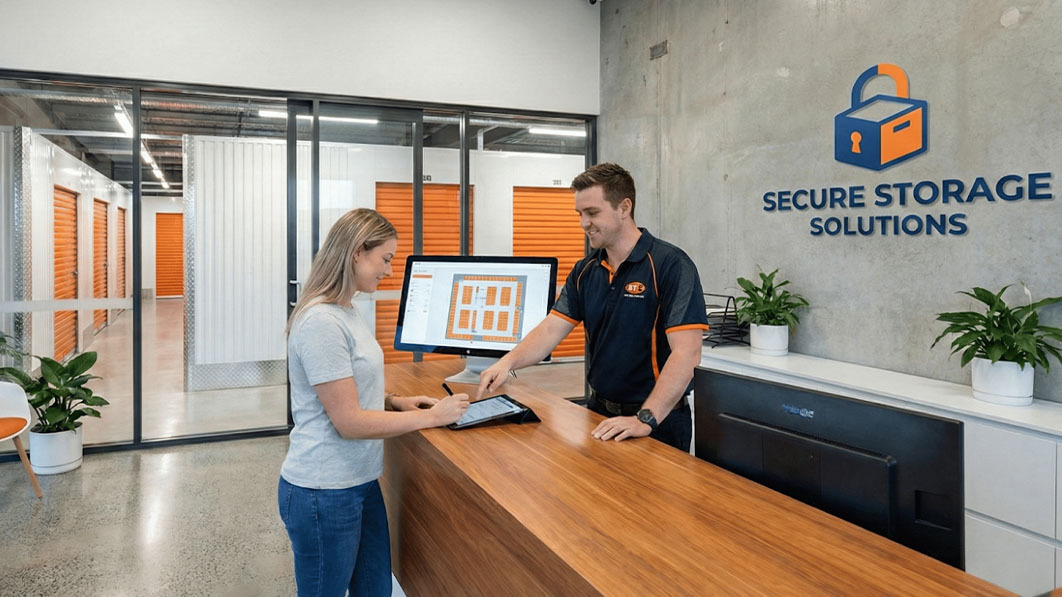Business tenants are becoming one of the fastest-growing customer segments in self storage.
Across the U.S. and UK, companies now rent units to store inventory, equipment, and documents.
This change is being driven by the rise of ecommerce and the increasing prevalence of flexible working. Companies may be downsizing their office space, but they still need a secure location to store critical business items.
In the UK alone, the self storage industry generated £1.2 billion in turnover in 2025, and around a quarter of renters are businesses, with many using their units as operational space. The U.S. market shows a similar pattern.
For operators, this presents a clear opportunity. Business customers typically rent larger spaces, stay longer, and provide steady income.
This article explains how to attract and manage these clients efficiently, and how Stora’s automation tools simplify scaling your business storage offering.
What Business Customers Look for in Self Storage

Photo by Cottonbro Studio
Business renters have very different expectations from people storing personal items.
They’re not just looking for a convenient space; they need a storage solution that supports their day-to-day operations.
Understanding these needs can help you position your facility as the go-to option for local companies.
Things to consider are:
Reliable access and security
Businesses often need to collect or deliver goods outside normal hours. Offering 24/7 access and smart entry systems allows teams to come and go securely, without on-site staff.
They also often want to store valuable items like stock, tools, and machinery. It’s critical to ensure your facility is as secure as possible.
Flexible leases and billing
Companies value contracts that scale with their needs. Monthly billing, adjustable unit sizes, and automated recurring payments keep things simple for both sides.
Space designed for work
Drive-up units, loading bays, and extra height ceilings are ideal for deliveries, stock, and equipment. Some business tenants even use their units as mini-distribution hubs.
Professional presentation
Businesses expect the same professional standards they offer their own customers. By providing clean, well-lit spaces and responsive support, you build trust with them.
By tailoring your facility and marketing around these priorities, you’ll attract longer-term, higher-value tenants.
What Types of Businesses Typically Hire Self Storage Units?

Photo by Polina Tankilevitch
Understanding the different types of companies that rely on storage enables you to tailor your marketing, pricing, and unit layouts to match what they need most.
Typical examples include:
Ecommerce and online retailers: Small online sellers often outgrow their home garages or spare rooms but aren’t ready for a full warehouse lease. Self storage offers them secure, flexible space for inventory, packaging, and returns, often close to major delivery routes.
Trades and service businesses: Builders, electricians, plumbers, and other tradespeople rely on safe, dry storage for tools, equipment, and materials. They value drive-up units, 24-hour access, and clearly marked loading areas that make daily collections and drop-offs easy. Security is also crucial, as their tools are often worth a significant amount of money.
Professional services and contractors: Accountants, architects, and solicitors frequently rent units for document storage, archived client files, or office furniture. These tenants appreciate climate control and clean, well-lit spaces.
Event and hire companies: Businesses that manage furniture, tents, props, or audio-visual equipment require spaces that are easily accessible by large vehicles. Flexible rental terms are key, as demand can fluctuate throughout the year.
Local retailers and independent brands: High-street shops and independent makers use self storage to manage stock overflow, especially during busy periods. Being able to scale up or down quickly without the long-term commitment of a warehouse lease makes storage units an ideal solution.
4 Benefits of Targeting Business Customers
Focusing on business tenants can make your self storage facility more stable and profitable.
Here are four benefits of working with this customer type:
1. Longer rental periods
Business customers typically rent for years rather than months. Whether it’s an ecommerce brand storing stock or a tradesperson keeping tools safe, their storage needs are ongoing. This means fewer move-ins and move-outs, and more predictable income.
2. Higher revenue per unit
Companies tend to rent larger units to hold equipment, packaging materials, or documents. This increases your average revenue per customer and helps boost occupancy rates.
3. Consistent demand
Unlike personal storage, which can fluctuate seasonally, business use is steady. Many operators report that commercial tenants help balance occupancy across the year, even when residential demand dips.
4. Lower churn and stronger relationships
Long-term contracts give you time to build relationships with business clients. Many will stay with you for years if the service is reliable and the process is simple.
9 Steps to Adapt Your Self Storage Facility for Businesses
Business tenants seek reliable partners who can support their operations on a long-term basis.
Here are some tips to win their business and serve them well:
1. Build a dedicated business storage landing page
Begin by creating a section on your website aimed at commercial users.
Explain how your units can be used. Examples might include:
Storing inventory for ecommerce sellers.
Equipment for trades.
Archiving paperwork for service businesses.
Use clear, benefit-led language and relevant keywords like “business storage,” “commercial storage,” or “secure warehouse space.”
Add photos of wide access doors, loading bays, or delivery areas so visitors can imagine how easily they could operate from your site.
Here’s a typical example from UK-based company Storage Giant.

💡 Pro tip: Use headings to answer customer questionsStructure your content to answer the questions business customers actually search for, such as: “Can I run my business from a storage unit?” or “How do I store business stock safely?” |
2. Build local partnerships
Instead of just marketing to local companies, think about how you can create mutually beneficial relationships that benefit both sides.
For example, collaborate with removal firms, courier companies, or office relocation services.
These businesses regularly work with companies that need temporary or long-term storage and can refer clients directly to you.
In return, you could offer discounted space or co-branded promotions that help them add value to their own services.
You can also team up with business parks, co-working spaces, or logistics hubs to provide overflow storage for their tenants.
A referral agreement or shared marketing materials can make these partnerships simple to manage while keeping your facility top of mind for nearby businesses.
3. Run targeted online campaigns
Digital ads work best when they’re precise. Use Google Ads to target local searches such as:
Business storage near me
Secure commercial units
Commercial storage [your city]
Focus on convenience and reliability in your messaging. Businesses want reassurance that access is easy, billing is flexible, and support is responsive.
Phrases like “Flexible space that grows with your business” or “24/7 access for your team” resonate far more than general storage slogans.

LinkedIn is another effective platform for reaching business decision-makers, rather than a general audience.
Use LinkedIn Campaign Manager to build a targeted audience by job title and industry. You can also narrow your ads by location, ideal if your facility mainly serves a specific region or industrial area.
Sponsored posts with concise, direct copy, such as: “Flexible storage space for your growing business” or “Keep your inventory secure and accessible 24/7,” tend to perform well.
4. Use reviews and testimonials
If you already have business clients, their feedback can be one of your most effective marketing tools.
Ask for testimonials that highlight how your storage has helped them save time or scale their operations. Include these quotes on your business storage page to build trust and authority.
Stora customer Standby Self Storage does this. It proudly displays its positive reviews using a carousel on its homepage.

5. Streamline onboarding
Business customers expect quick, professional onboarding. Use automated online booking forms that capture all necessary details upfront.
This might include:
Company name and address.
Details of your primary point of contact.
VAT or tax ID.
Billing details.
💡 Pro tip: Use digital signaturesDigital signatures enable customers to securely review and sign documents from any device, eliminating the need for paper copies or in-person visits. Platforms like DocuSign or Adobe Acrobat Sign use encryption and audit trails to verify each signature, ensuring the contract is legally binding. For operators, this reduces admin time, prevents lost paperwork, and creates a clear digital record of every agreement. |
6. Simplify payments and renewals
Companies prefer predictable billing. Offer automated monthly invoices, card payments, or bank transfers, and include itemized statements if they rent multiple units.
Many facilities also find it helpful to set up reminders for renewals or overdue payments, ensuring consistent and polite communication.
7. Support multiple contacts
Unlike individual renters, a business may have multiple authorized users, especially if it has a team operating from the storage unit. Maintain clear records of who has access to which units and update them regularly to prevent security issues.
8. Monitor usage and feedback
Track occupancy and usage trends for your business customers. If a tenant is expanding, offer an additional unit before they ask. If they downsize, make it easy to adjust their contract. Reviewing feedback every few months enables you to understand their priorities and strengthens retention.
When you treat your business tenants like long-term partners rather than short-term renters, you’ll see the rewards in loyalty, efficiency, and steady income.
9. Bonus Tip: Get the Right Software
As we’ve seen in this article so far, business customers expect convenience and professionalism from their storage provider.
They want to book instantly, pay automatically, and manage their accounts without friction. Meeting that standard requires the right technology behind the scenes.
This section looks at some of the capabilities that a business self storage facility needs and the technologies that help you meet these requirements.
A professional, high-performing website
When a business customer lands on your website, they expect clarity and professionalism.
They want to see:
Unit dimensions.
Facility features.
Photos and videos of units.
Real-time availability.
Accurate pricing.
The ability to book immediately.
By removing the need to contact you or visit your facility to book, you reduce barriers and make it more likely you will win their business.
Stora’s built-in website platform helps operators achieve this. It’s designed specifically for self storage, with conversion-focused layouts, integrated lead capture, and SEO tools to help your facility rank for local business searches.
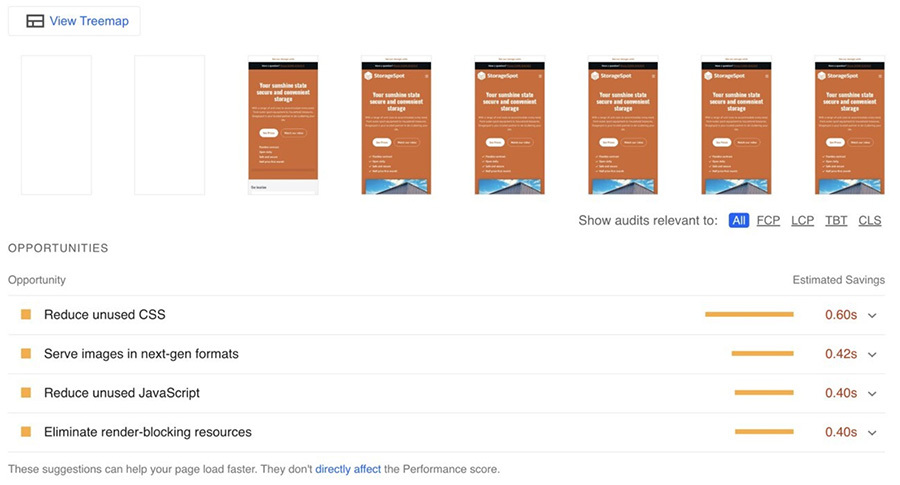
📖 Check out our guides to learn more: |
Advanced security and surveillance
As mentioned earlier, business customers store valuable stock, equipment, or sensitive documents that are often worth far more than the rental cost itself. Therefore, making your facility secure is critical.
Secure fencing is an important part of this. But you should also make use of technologies like:
CCTV.
Remote monitoring.
Motion detection.
Smart locks.
Access control systems.
Many of these systems not only deter theft but also provide an auditable record of who accessed which unit and when.
You should also be able to set automated alerts to notify you or a tenant instantly if a door is forced, a camera loses signal, or an access attempt fails.
PTI Security Systems is a good example of a company providing specialized facility access and monitoring hardware and software.
It provides keypads, mobiles, and cloud-based technologies to create a secure, contactless experience for tenants.
Business customers benefit from being able to access their units through a PIN, mobile app, or Bluetooth connection. Each action is logged automatically, creating a record of who accessed the site and when.
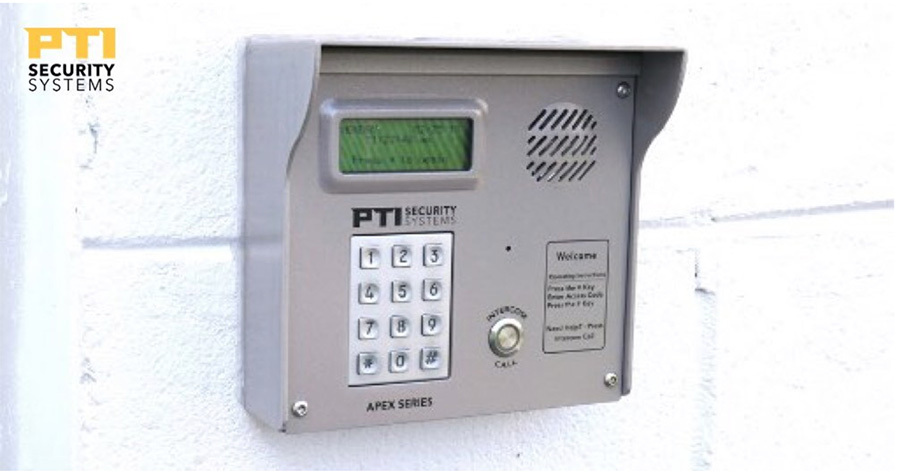
📖 Check out our guides to learn more: |
Reliable payments and accounting
For business customers, accurate invoicing is essential. They often need itemised records for their own accountants or to claim expenses, and a single mistake can cause unnecessary admin or payment delays.
That’s why automated payments are so valuable. When a customer can set up secure recurring billing from the start, it removes friction and ensures rent is always collected on time.
It’s convenient for them, as there are no missed deadlines or manual transfers, and it gives you predictable, steady cashflow.
With Stora, invoices are generated, processed, and recorded automatically. Overdue accounts trigger reminders instantly, and if a payment remains outstanding, the customer’s unit can be automatically overlocked until the balance is cleared.
This allows you to maintain control without awkward conversations or time-consuming follow-ups.
To find out more about how automated payments can benefit your business, check out Brant Self Storage’s success story.
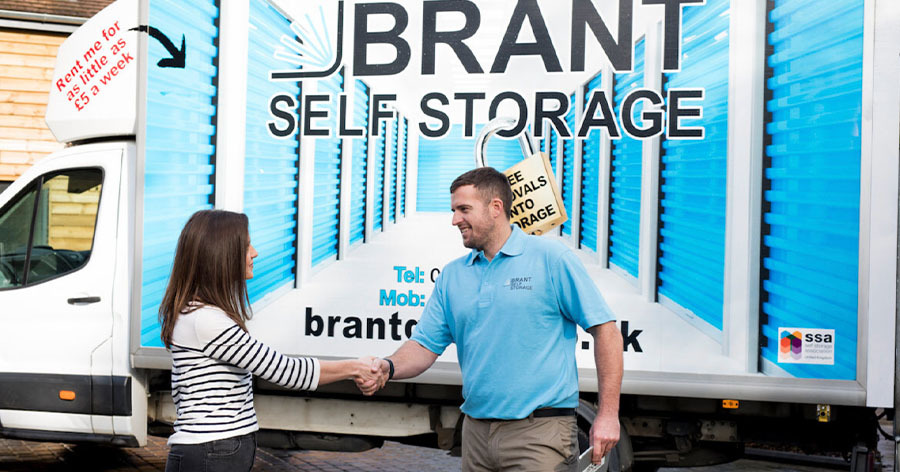
Climate control and environmental monitoring
Businesses storing items like electronics, documents, or retail stock need stable temperature and humidity.
Smart environmental sensors allow operators to track conditions in real time and receive alerts if thresholds are breached. This data can be shared with tenants as proof that their goods are being stored safely and compliantly.
Automating climate control through connected systems also reduces energy waste, helping facilities balance efficiency with quality of service.
📖 Check out our guide covering everything you need to know about storage unit climate control to learn more. |
Customer communication and support
Good customer support is arguably more important for business customers than it is for those storing personal items, as it can affect their ability to operate.
For example, if a tradesperson needs to pick up some tools but can’t access their unit due to a fault, then they may not be able to carry out a job that day.
Email automation tools, chat widgets, and integrated CRMs make it easier to respond quickly to enquiries, schedule renewals, and handle support requests.
Many operators now use help desk systems that log conversations by tenant, so every team member can see the full communication history.
A good example is Stora customer Secured Spaces. They have a convenient chat widget on their home page, so that customers and potential customers can quickly get in touch or find information.
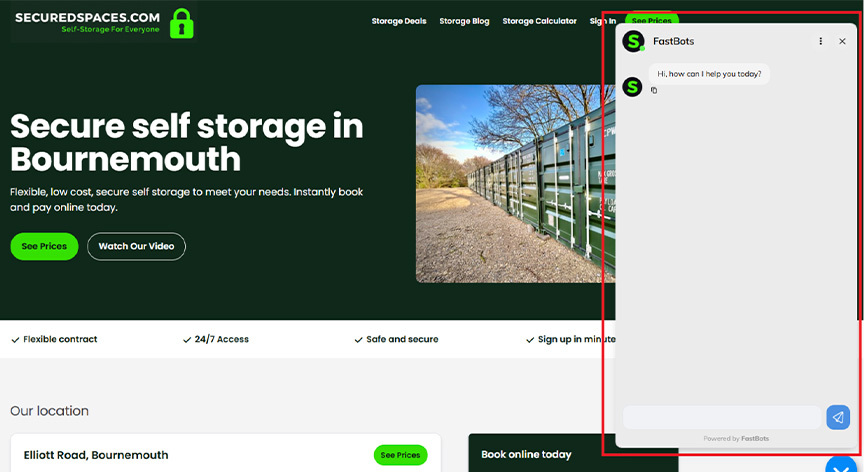
📖 Read our list of 11 self storage customer service best practices to learn more. |
Clear insight and control
Accurate, real-time data allows you to track which units are occupied, which customers are expanding their space requirements, and more. This, in turn, can help you adjust your business to ensure it meets customer needs.
For example, if you notice that a business has been booking extra units on and off, then you might offer them a larger unit at a discount. This will help meet their needs, stabilize your bookings, and retain their loyalty in future.
A unified dashboard gives operators a complete picture of occupancy rates, revenue, and customer behaviour at a glance.
You can see which business clients have been consistently on time with payments, who’s approaching contract renewal, and where opportunities exist to upsell additional units.
With Stora, these insights are automatic. The system tracks revenue trends, occupancy changes, and lead sources in real time, helping operators make smarter decisions about pricing, marketing, and customer retention.
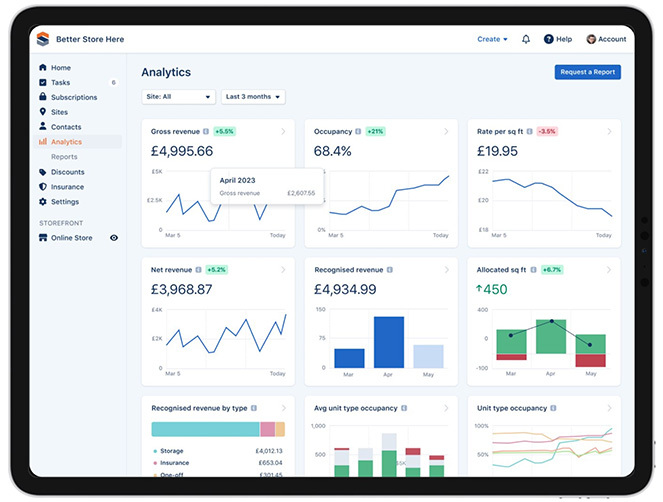
Integrating technology across your facility
Modern storage facilities run on multiple systems, from access control and accounting to marketing and customer management.
When those tools operate in isolation, information gets lost and staff spend time copying data between platforms.
Integrating these systems means everything works together. Bookings automatically create customer records, payments update your accounts, and access permissions adjust in real time when a tenant moves in or out.
You always know who’s on-site, which units are occupied, and how your revenue is tracking — without logging into five different apps.
Stora brings these processes into one place. It connects key tools like Stripe for payments, Xero for accounting, and smart entry systems for access so data flows automatically between them.
The result is a single source of truth for your business: accurate information, fewer errors, and a lot less manual work.
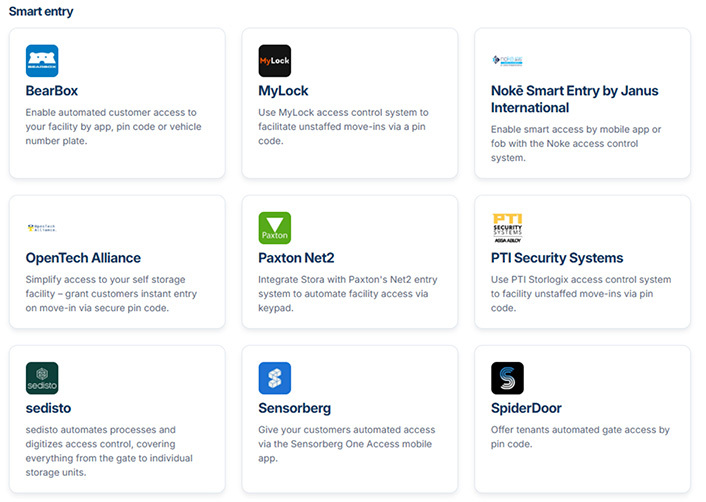
Provide a Great Service to Business Customers With Stora
An increasing number of companies are turning to self storage for their business needs.
Operators who can offer a seamless, professional, and technology-driven experience are more likely to capitalize on this trend.
From automated onboarding and digital payments to smart access control and integrated reporting, the right technology transforms your facility into a dependable partner for local businesses.
If you’re ready to simplify how you run your facility and deliver the level of service modern business customers expect, book a demo with Stora.
You’ll see how its automation tools, website tools, and smart integrations help you save time, improve your cash flow, and grow your commercial customer base.



